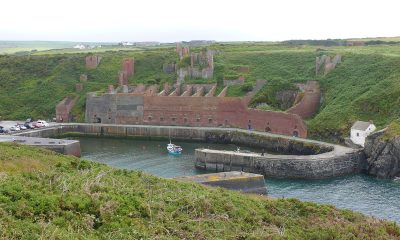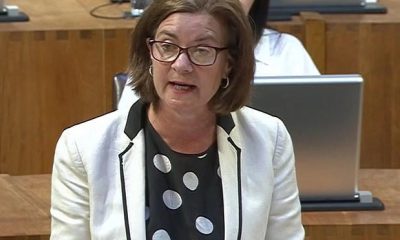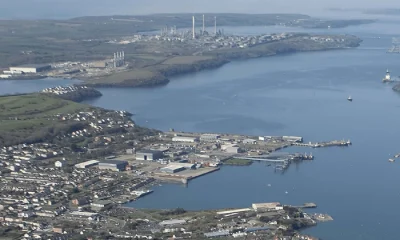Farming
Welsh farmers on the brink: Could we soon see protests like in Europe?
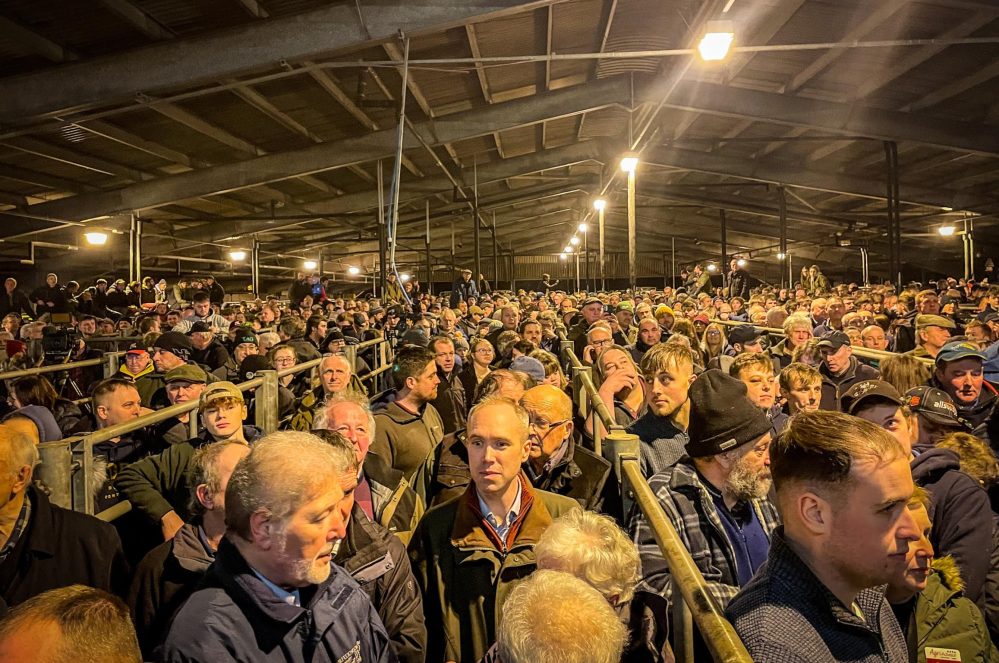
WHILE scenes of agricultural protest sweep across Europe, from the bustling streets of Brussels to the historic avenues of Berlin, Britain’s farmland remains notably calm. Yet, farmers have been gathering in large numbers, voicing their concerns in packing out cattle markets rather than taking their issues directly to the streets.
The relative quiet of the farmers in Wales might seem puzzling against the backdrop of widespread European demonstrations. The agriculture sector across the whole of the UK, in fact, is grappling with significant challenges.
Recent surveys revealing alarming concerns among fruit, vegetable, and dairy producers about their survival in the coming years.
Nearly half of the UK’s fruit and veg growers and a third of dairy farmers fear their operations may not last beyond 2025, a statistic that paints a grim picture of the industry’s future.
One might speculate that Brexit has shielded British farmers from the tumult affecting their European counterparts.
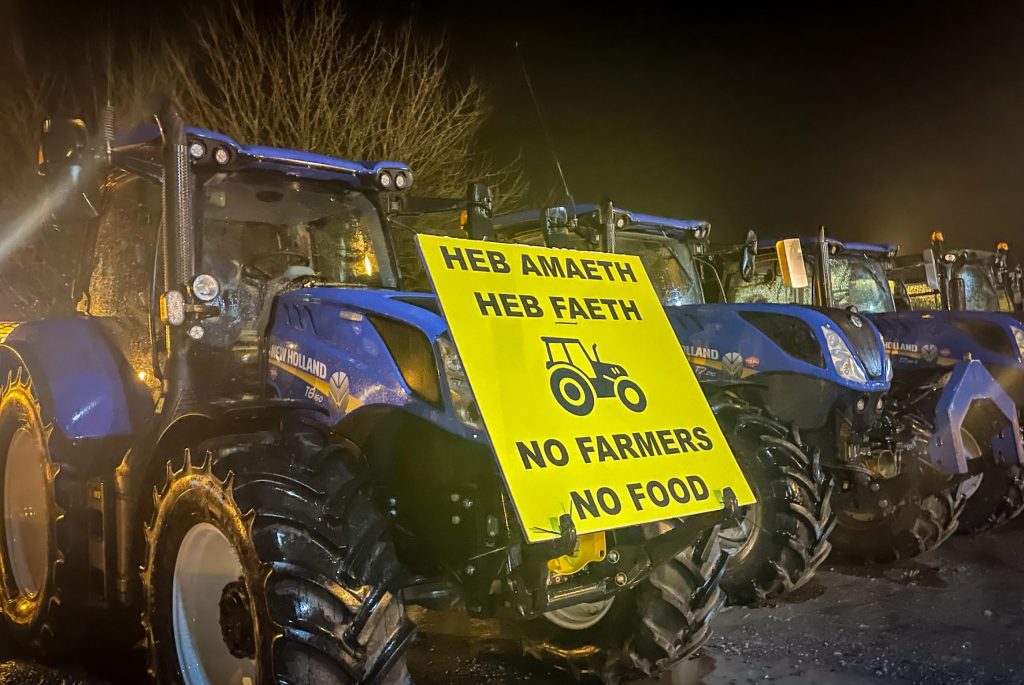
However, this assumption quickly falls apart when one delves into the myriad issues facing UK agriculture.
The crisis is not of isolation but of scale, economics, and policy. British farms are generally larger than those in the EU, which may buffer them against some pressures but does not immunize them against the high costs of fuel, stringent environmental regulations, and the uncertainties post-Brexit policy changes bring.
In Wales, the situation is particularly acute. The Welsh government’s Sustainable Farming Scheme, set to redefine agricultural funding post-Brexit, demands significant environmental commitments from farmers.
They are required to dedicate portions of their land to tree planting and wildlife habitats, a mandate that many argue is impractical without undermining their business viability.
Coupled with the reduction in environmental payment schemes and sweeping regulations on slurry and fertiliser usage under the new nitrate vulnerable zones (NVZ) policy, Welsh farmers find themselves at a crossroads.
The dissatisfaction runs deeper, touching on the essence of farming identity and its place in society. British farmers, particularly in Wales, express a profound concern over their perception by the public and the political establishment. There is a fear of far-right or populist groups exploiting their cause, a worry compounded by a perceived lack of public empathy towards the agricultural sector. This cultural and political disconnect has left many feeling isolated and misunderstood, reluctant to adopt the protest tactics seen elsewhere in Europe.
Moreover, the shadow of bovine tuberculosis (TB) looms large, with Welsh farmers calling for more decisive action to tackle the disease that has led to significant cattle losses. The government’s refusal to consider a badger cull, seen by many as a necessary measure, has added to the sense of frustration and helplessness within the farming community.
The challenges are manifold: rising operational costs, from fertilisers to machinery fuels, have squeezed margins to breaking points, while environmental and regulatory demands place additional burdens on an already struggling sector. Yet, despite these hurdles, the response from Welsh farmers and their British counterparts has been markedly different from the uproar seen across the Channel.
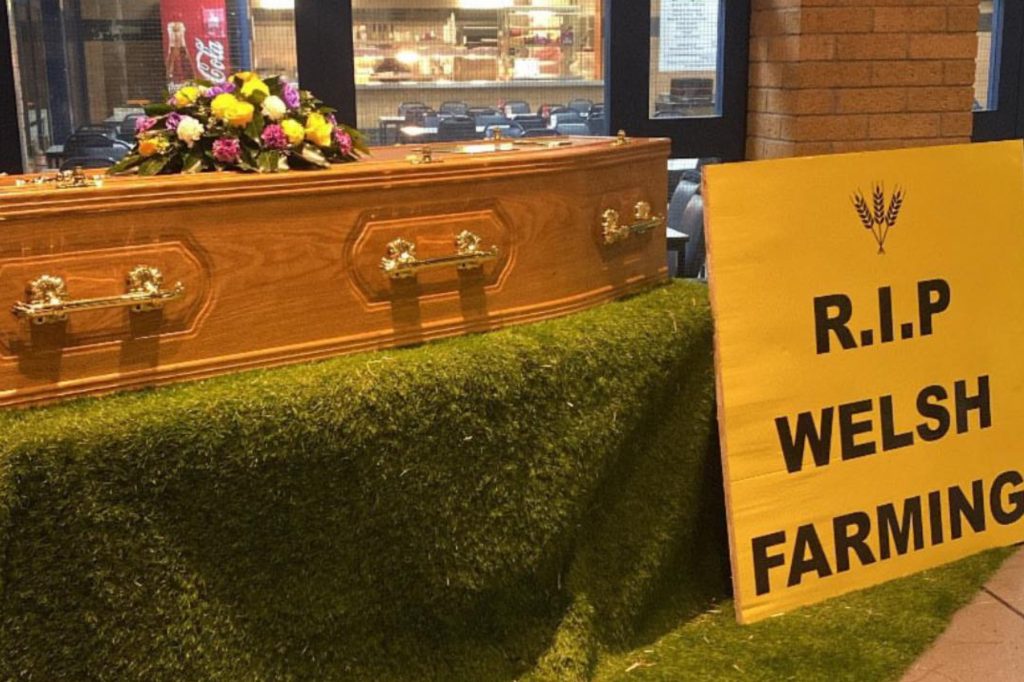
This divergence perhaps speaks to a broader narrative about the British agricultural ethos – one of quiet endurance and a focus on adaptation over confrontation. The farming community in the UK, and particularly in Wales, is at a pivotal moment, navigating the complexities of modern agriculture, environmental stewardship, and economic survival.
In response to the crisis, Welsh Government Minister for Rural Affairs, Lesley Griffiths MS, has invited the presidents of the two farming unions to an urgent meeting to hear their views and discuss the serious concerns of Welsh farmers and rural businesses.
The meeting has been arranged following an urgent request from NFU Cymru President Aled Jones who met with Minister Griffiths earlier this week to express the deep sense of feeling and anguish that the industry is feeling at this moment in time.
NFU Cymru President, Aled Jones said: “We met with the Rural Affairs Minister Lesley Griffiths on Tuesday this week to express the deep concerns of the industry and we left her in no doubt over the strength of feeling and seriousness of the situation following the robust feedback we have received from our series of roadshows. I welcome the fact that the Minister recognises the serious concerns of farmers and as such has agreed to meet and look at ways to address these issues.
“Having travelled the length and breadth of Wales in the past week and met with thousands of members, it is clear that the current Sustainable Farming Scheme (SFS) consultation and the proposals laid out in it are causing a deep sense of anguish and concern as members contemplate the future scheme and the implications on their own individual business.
“The Minister has assured me this remains a genuine consultation and so I would urge anyone with an interest in Welsh farming to respond and let the Government know directly the strength of feeling that exists amongst our farming community. The information, briefings and response template are all available on the NFU Cymru website.
“The current consultation which proposes that the Basic Payment Scheme will be fully phased out in 2029 with no long-term stability payment in its place within the SFS is set against the backdrop of a challenging time for Welsh farmers. Agricultural inputs are over a third higher than pre-covid times, water quality regulations have added a huge regulatory and cost burden on farming businesses and bovine TB continues to cause heartache to farming families.
“NFU Cymru will take the concerns of the industry directly to the Minister at our meeting, and we will clearly set out our key asks.”
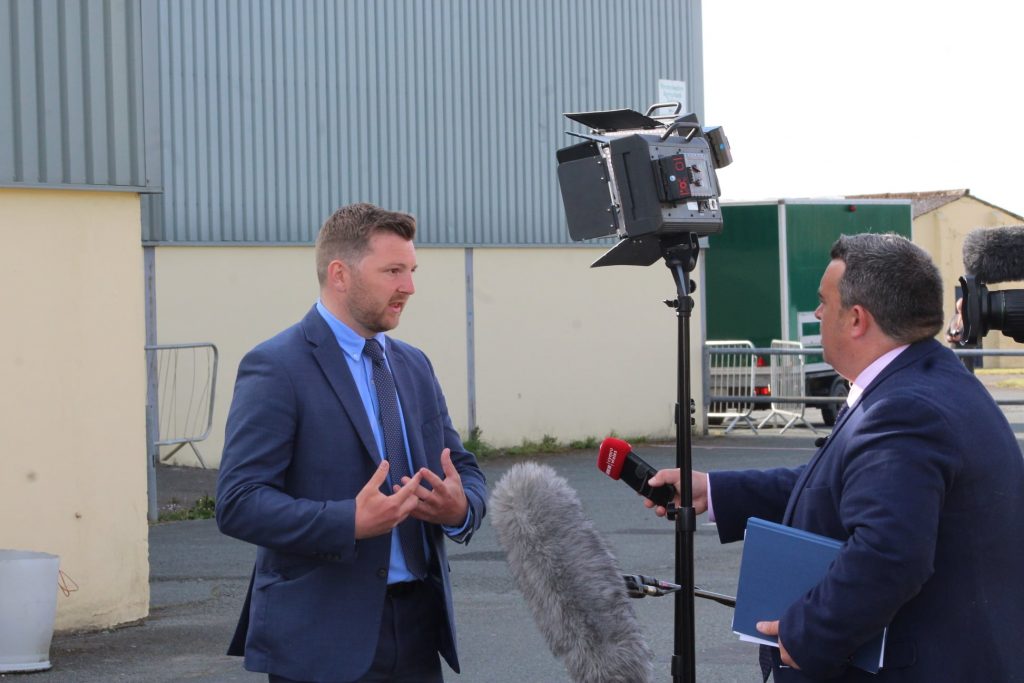
The conservatives, in opposition in Wales, have been vocal about what they feel is Welsh Labour’s lack of support for the farming industry.
Responding to news that protest action amongst farmers may soon be “inevitable”, Samuel Kurtz MS, Shadow Rural Affairs Minister, said: “The Labour Government must listen to the farming industry before it is too late.
“Welsh farmers have had to deal with a host of policy changes in a short space of time, their frustration is not being heard by the Labour Government and they are left feeling protests are the only option.
“There is a real sense of frustration and anger in the sector at the moment, therefore I am urging the Welsh Government to pause this consultation and to redouble their efforts to get the scheme right so that it works for Wales’ farmers.”
He later added: “Had the Welsh Government taken seriously my calls to pause the SFS consultation, then changes to the proposal could have been made. Sadly, my calls, like the calls from the farmers themselves were ignored.
“The inevitably of farmers protesting is linked to the Welsh Government’s inability to listen.
“I will stand shoulder to shoulder with farmers during any protest. My message to them is only stick together, be respectful, but the Welsh Conservatives will be with you.”
Cefin Campbell, Plaid Cymru Member of the Senedd for Mid & West Wales, who spoke at the large farmers’ meeting on Thursday (Feb 8), said: “Enough is enough was the resounding message amidst the 3,000 heavy crowd in Carmarthen.
“The frustration our farmers and rural communities feel towards the Welsh Government and Westminster on many issues was all too clear. I will do my best to make sure their voice is heard in Cardiff Bay, and I would urge the Welsh Government to accept the unanimous call made by those present for a meeting, where these concerns can be discussed further”.
Community
Celebrating nature recovery through Cysylltu Natur 25×25

A CELEBRATION event was held on Saturday, January 24 in Cwm Gwaun to mark the achievements of Pembrokeshire Coast National Park Authority’s Cysylltu Natur 25×25 project, bringing together volunteers, farmers and staff involved in delivering nature restoration across North Pembrokeshire.
The landscape-scale project was funded by the Welsh Government through the Nature Networks Programme, delivered by the Heritage Fund. The Programme aims to strengthen ecological connectivity and resilience by restoring habitats at scale.
Those attending the event heard about the wide range of conservation activity delivered through the project across the north of the National Park. This has included practical works to restore grazing to Rhos pasture to benefit marsh fritillary butterflies and southern damselflies, specialist work to conserve rare lichens, volunteer chough, dormouse and harvest mouse monitoring, safeguarding greater horseshoe bat hibernation sites, and targeted action to tackle invasive species threatening important sites.
Volunteers, farmers, land managers and contractors played a vital role in the success of the project, contributing local knowledge, practical skills and ongoing commitment to caring for Pembrokeshire’s unique landscapes and wildlife in the long term.
Mary Chadwick, Conservation Officer for Pembrokeshire Coast National Park Authority, said: “Cysylltu Natur 25×25 has shown what can be achieved when farmers, volunteers and conservation specialists work together with a shared aim.
“From monitoring some of our most elusive species to restoring and protecting habitats, the dedication of everyone involved has made a real difference for nature across the National Park.”
Although the Cysylltu Natur 25×25 project is now coming to an end, the important work it has supported will continue. Building on its successes, Pembrokeshire Coast National Park Authority will carry this momentum forward through the next phase of nature recovery work under NNF4 Cysylltiadau Naturiol / Naturally Connected, ensuring ongoing protection and enhancement of habitats for future generations.
Farming
Judicial review granted for hundreds of farmers and landowners in Wales

OVER three hundred Welsh farmers and landowners have been granted the right to legally challenge Green GEN Cymru’s ‘unlawful behaviour’ at the High Court.
The collective filed a judicial review application on behalf of the community groups, Justice for Wales and CPRW, on four separate grounds, including claims that the energy company has acted unlawfully and with disregard for biosecurity and the environment, while trying to gain access to private land to conduct surveys for three major overhead pylon routes.
The proposal will see the energy infrastructure and pylons spanning 200 km across Powys, Ceredigion, Carmarthen, and Montgomeryshire in Wales and across the Welsh border into Shropshire, in the West Midlands of England.

Mrs Justice Jefford granted permission on four grounds – including abuse of power and procedural impropriety – during the three-and-a-half-hour hearing at Cardiff Civil Justice Centre on Tuesday, January 20.
A two-day hearing is expected to take place in April 2026, date to be confirmed.
The judge also accepted an undertaking from Green GEN Cymru that it would not enter land using s.172 powers – the right given to acquiring authorities to enter land to conduct surveys or valuations under the Housing and Planning Act 2016 – until an urgent interim relief application hearing can be held.
Natalie Barstow, founder of Justice for Wales, said: “This is a moment of vindication. For months, we have been left feeling unsafe in our own homes and stripped of our power as farmers and landowners.
“This is not a protest against renewable energy; this is about standing up for what is right. Our right to dignity and to have a voice, and for the future of our land, wildlife, and livelihoods.
“Since we began this battle, hundreds of other farmers and landowners across Wales have come forward with similar stories, and we’ve been supported by many generous donations to fund the legal challenge. We knew we weren’t alone in our concerns, but the response demonstrates it is a far wider issue than we initially feared, and why it is so important that Green GEN’s conduct and protocols are properly scrutinised.
“We said we will not be bullied into submission, and this judgment is just the first foot forward in our fight for justice.”
Mary Smith, a lawyer at New South Law, the law firm representing the impacted communities, said: “Holding acquiring authority status does not entitle a company to disregard the limits of its statutory powers or the rights of the people affected.
“The Court’s decision confirms that Green GEN Cymru must be held to the same legal standards as any other public body when exercising intrusive powers over private land. This case is about restoring fairness, accountability, and respect for the communities whose livelihoods and environments are at stake.”
Farming
New rules to make Welsh lamb pricing clearer set to begin next week

Mandatory carcass grading and price reporting will be required in slaughterhouses from Wednesday, January 28
WELSH sheep farmers are set to see new rules introduced next week aimed at making the lamb market fairer and more transparent.
From Wednesday (Jan 28), slaughterhouses in Wales will be required to classify sheep carcasses and report prices using a standardised system. The Welsh Government says the move will improve consistency in grading, make price information easier to compare, and help build confidence for farmers selling stock.

Deputy First Minister Huw Irranca-Davies announced the change during the Farmers’ Union of Wales (FUW) Farmhouse Breakfast event at the Norwegian Church in Cardiff.
He said the measures would support the industry by ensuring a consistent methodology for classifying carcasses in slaughterhouses, promoting transparency, fairness and productivity within the sheep market.
“Our iconic Welsh lamb is celebrated around the world for its outstanding quality and high production standards,” he said. “These measures will implement a consistent methodology for classifying sheep carcasses in slaughterhouses, promoting transparency, fairness, and increased productivity within the sheep market.”
The regulations bring the sheep sector into line with rules already used for beef and pork.
Hybu Cig Cymru – Meat Promotion Wales chief executive José Peralta said the changes would allow for greater data capture and analysis and improve transparency within the supply chain.
He said: “The new regulations, which now align with a similar position for cattle and pigs, will allow for greater data capture and analysis to be undertaken and support increased transparency within the sector. As a sector we must seek all opportunities for greater transparency within the supply chain to ensure that choices can be made from an informed position.”
The Welsh Government says the new approach is part of a wider UK framework, with similar arrangements already operating elsewhere.
During his address, the Deputy First Minister also pointed to further changes expected in 2026, including the planned introduction of the Sustainable Farming Scheme, which the Welsh Government describes as a new partnership between the people of Wales and farmers.
The scheme is intended to support the sustainable production of food while also responding to the climate and nature emergency.
The Welsh Government has also confirmed its commitment to financial support during the transition, with up to £238 million committed to the Universal layer and the legacy Basic Payment Scheme in 2026.
Deputy First Minister Huw Irranca-Davies said: “I would like to reiterate the Welsh Government’s commitment to supporting Welsh family farms, not just in the short term but also in the long run. Our goal is to prioritise stability for the farming industry, ensuring to balance this with sustainability at its very core.”
He added that supporting farmers through the change would be a priority, with consistent advice and support offered across the sector.
Building fairness within the agricultural supply chain remains a key Welsh Government priority, which it says is also integral to food security.
-

 Crime2 days ago
Crime2 days agoSex offender jailed after living off grid in Pembrokeshire and refusing to register
-

 Health15 hours ago
Health15 hours agoHealth board targets rise in steroid and gym drug use across west Wales
-

 News3 days ago
News3 days agoPrincess of Wales visits historic Pembrokeshire woollen mill
-

 Crime7 days ago
Crime7 days agoPembroke man accused of child sex offences sent to Swansea Crown Court
-

 Health5 days ago
Health5 days agoDoctor struck off after sexual misconduct findings at Withybush Hospital
-

 Crime17 hours ago
Crime17 hours agoTeacher injured and teenager arrested for attempted murder at Milford Haven School
-

 Community7 days ago
Community7 days ago50s women threaten legal action over pension compensation refusal
-

 Education6 days ago
Education6 days agoIndustry insight helps marine cadets chart career course







